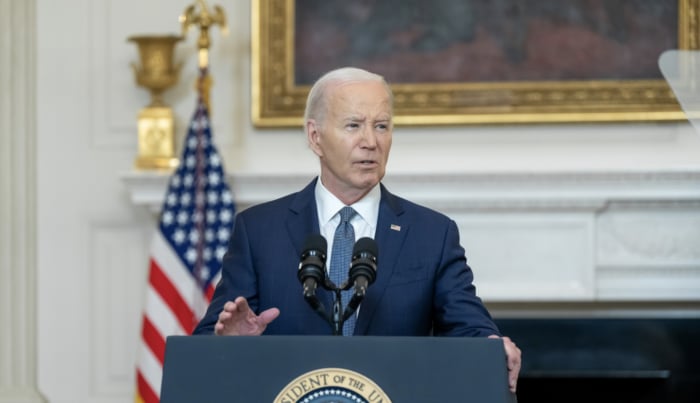
Important:
November 15, 2024: A federal judge struck down the Parole in Place expansion. As a result, USCIS will no longer accept new Form I-131F applications and will also stop processing any pending applications. All upcoming Application Support Center appointments for Form I-131F are now canceled. Anyone arriving for these appointments will be turned away.
On June 18, 2024, the Biden administration announced a new policy that will grant temporary legal status and a potential path to citizenship for hundreds of thousands of undocumented immigrants married to U.S. citizens. This policy, known as “parole in place” (PIP), is part of the Department of Homeland Security’s (DHS) actions to promote family unity in the immigration process, consistent with the Biden-Harris administration’s commitment to keeping families together.
Starting August 19, USCIS will begin accepting the new Form I-131F, an electronic application for Parole in Place for certain noncitizen spouses and stepchildren of U.S. citizens. From August 19 onward, Form I-131F will only be available on uscis.gov via your USCIS online account. The agency says no other forms will be accepted for the Keeping Families Together process.
Start preparing now with Boundless’ comprehensive parole-in-place workbook, then continue your journey with us to a marriage green card. Get started now.
Filing Guide Now Available
USCIS has published a comprehensive Filing Guide for Form I-131F on the Keeping Families Together webpage. This guide provides crucial information to help individuals prepare their applications for the Parole in Place program.
What does the policy say?
The policy, known as “parole in place (PIP),” allows undocumented immigrants who have American citizen spouses or stepchildren with U.S. citizen parents to receive temporary work permits and legal status. It also allows them to navigate around certain U.S. legal obstacles that currently prevent them from obtaining permanent residency if they entered the country illegally. By obtaining parole in place, these individuals could eventually qualify for green cards and, later, U.S. citizenship without needing to leave the country.
According to the White House, the move will protect roughly half a million spouses of U.S. citizens and around 50,000 undocumented children under 21 whose parent is married to a U.S. citizen.
Who is eligible?
To be considered for a discretionary grant of parole, on a case-by-case basis, under this process, you must:
- Be present in the United States without admission or parole
- If you are the undocumented spouses of a U.S. citizen, you must have been continuously present in the United States for at least 10 years as of June 17, 2024 through the date you file your request. For stepchildren, you must have been continuously physically present in the U.S. since June 17, 2024 through the date you file your request.
- Have a legally valid marriage to a U.S. citizen as of June 17, 2024 or for stepchildren, have a noncitizen parent legally married to a U.S. citizen before your 18th birthday and on or before June 17, 2024.
- Not have any disqualifying criminal history or otherwise constitute a threat to national security or public safety
Important
Even if an applicant meets all the other criteria, immigration officials still have the final say in approving or denying the application.
Application Process
USCIS began accepting applications on August 19, 2024 using a new electronic form, Form I-131F, Application for Parole in Place for Certain Noncitizen Spouses and Stepchildren of U.S. Citizens.
Key points about the application process:
- Form I-131F will only be available to file online.
- Each requestor, including minors, must file a separate Form I-131F.
- Each requestor, including minors, must have their own USCIS online account.
- There is no paper form for this process.
- USCIS is not accepting any other form for Keeping Families Together.
Start preparing now with Boundless’ comprehensive parole-in-place workbook, then continue your journey with us to a marriage green card. Get started now.
After Approval
Once approved, recipients will have three years to apply for permanent residency through the Parole in Place (PIP) program and will be eligible for work authorization.
Once undocumented spouses or stepchildren obtain PIP, they will receive an I-94 travel record. This record is crucial because it makes them eligible to adjust their status to a marriage-based green card.
The process is expected to be similar to the current military PIP program. These cases are typically processed quickly, and most beneficiaries can immediately file the I-485 application to adjust their status to a green card holder after parole is granted.
Navigate the parole-in-place process with confidence using Boundless’ step-by-step workbook. Then, when you’re ready for your green card, let Boundless guide you through the AOS process. Check eligibility.
Historical Context and Precedents
The concept of parole in place is not entirely new. Since the Bush administration, a smaller-scale version of this program has existed for immediate relatives of U.S. military members. Congress affirmed this policy in 2020. The proposed expansion would be the most extensive relief for undocumented immigrants since the 1986 amnesty law that legalized 2.7 million people.